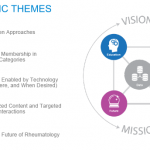Driving Research
In terms of research overall, a second focus area of the Foundation’s strategic plan stresses funding the best science, fostering innovation and encouraging collaboration.
“The Foundation has always been extraordinarily successful in supporting the kind of high-risk, high-reward research projects that can be hard to get funded otherwise, and have gone on to have big impacts even beyond our field,” says Dr. Holers. “To that point, rheumatology is the subspecialty that pioneered the biologic therapies that are being used for so many diseases. One reason we were able to do that is because our Foundation has made a concerted effort to fund innovative ideas, along with supporting the researchers capable of that kind of advanced research.”
A particularly fruitful way for the Foundation to support innovative research has been through bridge funding that assists the often-difficult transition from training years to the early career period. “This is a strategy in which an early-career investigator has written a grant that has been reviewed very positively, but has not received funding for that cycle,” says Dr. Holers. “With bridge funding, the Foundation provides carryover support while that investigator reworks and resubmits the grant for the following cycle.
“A high proportion of these resubmitted grants are then successful. I’ve seen this approach validated myself. At the Rheumatology Research Foundation Investigators Meeting I attended in June 2022, it was amazing to see so many early career investigators presenting papers and also making a point of mentioning that both grant and bridge funding from the Foundation had allowed them to get their next proposals funded by the U.S. National Institutes of Health and move their careers ahead.”
To further solidify the Foundation’s focus on cutting-edge work, it is currently undergoing a portfolio review to ensure best practices in its grant mechanisms and to identify new research areas to explore through 2023. Already, Dr. Holers notes, the Foundation is exploring data sciences, omics and other advanced scientific technologies that lead to translational research advances and should improve patient outcomes.
Leveraging Partnerships
The third focus of the 2022–27 strategic plan deals with leveraging relationships to grow rheumatology. One aspect of this broad focus involves strengthening collaborations with other rheumatology organizations as well as subspecialty groups, such as nephrologists, ophthalmologists and dermatologists, who share in providing coordinated care for rheumatologic and autoimmune diseases.
“We want to take advantage of that clinical cross-fertilization and cultivate research across these subspecialties, again with the ultimate goal of improving outcomes for our patients,” says Dr. Holers. After all, he adds, these are very complicated and involve multiple systems, so the research should include input from multiple disciplines.



